Center for Civic Education
What Is Authority?
Young scholars examine the concepts of power and authority as they begin learning about government in this elementary social studies lesson. Through a series of readings, discussions, and problem solving activities, children learn about...
May Media Group
Treatment Plants
Young scientists explore nature's water treatment plants in this simple science demonstration. By placing a stalk of celery in a cup of water mixed with food coloring, children are able to observe how plants absorb nutrients and...
Community Social Studies Unit
Lesson 1 - Community Social Studies Unit
Some problems are so big it takes an entire community to solve them. So was the case in the children's book Humphrey the Lost Whale: A True Story by Wendy Tokuda and Richard Hall. This primary grade lesson uses a class read-aloud of this...
All for KIDZ
Building Relationships: The Orphan of Ellis Island
Family and friendship are two very important themes of the historical fiction novel The Orphan of Ellis Island by Elvira Woodruff. From video clips and writing prompts to reader's theater and family interviews, this resource provides...
Critical Thinking Cooperative
Doing Our Share
Whether at home or in the classroom, each member of a community has certain responsibilities they must tend to. With the help of the children's story Piggybook by Anthony Browne, kids learn how to assign jobs in a fair and safe manner...
California Academy of Science
What Would Happen?
Nothing says classroom fun like an invertebrate and a magnifying glass! Snails, earthworms, and roly-poly bugs become the center of attention as pint-sized investigators hone their inquiry and observation skills. They are guided through...
Asian Art Museum
Defining "Home"
Open-ended dialogue and guiding questions lead children through a discussion about the relationship between physical objects and personal identity. They analyze the work of two contemporary Japanese artists who have use their mediums to...
New York Public Library
What's for Lunch?: New York City Restaurant Menus
Do you remember the days when a cup of coffee cost five cents? At A.W. Dennett restaurant in 1894, you could buy a five-cent cup of coffee and as well as a five-cent slice of pie to accompany it. The menu from that year is a primary...
Curated OER
What is a Philanthropist?
What does a philanthropist do? Help your class explore philanthropy using character development and literacy ideas. Learners will define and give examples of philanthropy, listen to The Lion and the Mouse, discuss how the characters help...
Curated OER
Understanding a Story
Reading comprehension is the name of the game! After listening to the teacher model and share personal prior knowledge about small children and what they do with food, the class discusses how they too can use prior knowledge to...
Alabama Learning Exchange
Yummy Apples!
Young learners listen to a read aloud of Gail Gibbons book, Apples and the story A Red House With No Windows and No Doors. They compare characteristics of a number of kinds of apples, graph them and create a apple print picture. Learners...
Core Knowledge Foundation
Christopher Columbus
Take some time to focus on Christopher Columbus, his three ships, the purpose of his voyage, and the new land he discovered. Pay special attention to the included additional materials, they are the real value in this resource.
Montana Office of Public Instruction
Eat Smart Be Smart
Get children's blood pumping with this primary grade activity on the human heart. After learning about the important role this muscle plays in the human body, learners monitor their heart rates and discover the importance of staying active.
Curated OER
Oral Stories
Legends are stories that have been retold as they have been passed down through the generations. Learners orally retell The Legend of the Bluebonnet in their own unique way after discussing the importance of oral traditions and...
Curated OER
Lesson 2: Chronological Order
Examining life events is a great way to learn about chronological order. Sequencing and time order are analyzed after reading a book about Rosa Parks. With a chart, the class works together to put the events from Mrs. Parks' life in the...
Curated OER
Significant Contribution
Examine the lives of people who have made a significant contribution to society. The concept of biography is discussed with the class; they identify important actions, and read passages about Sacagawea and Benjamin Franklin. They write...
Curated OER
Explanatory Myths Lesson
A myth is a story that explains something in nature or society. Dive into the study of mythology as you read The Golden Flower with your class. Charts are used to define the characteristics of myths as well as to determine the main point...
Curated OER
Lesson 1: Effects
If You Give a Mouse a Cookie is a perfect book to use when your class is ready to learn about cause and effect. They consider the meanings of the words cause and effect as you read the story. Working together you'll identify, discuss,...
Curated OER
Causes
Things usually don't happen without a reason; usually any event has a cause that got the ball rolling. The book, If You Give a Mouse a Muffin is used to help learners understand the concept of causes in literature. Examples from the...
Curated OER
Lesson 3: Cause and Effect Relationships
The Gunniwolf is a book full of events that get kids asking why and what. They note several events on a chart, and then discuss how they think the instructor is able to determine the causes and effects they find. They continue reading...
Curated OER
Hyperboles
Want to see the best instructional activity is the entire universe? Who doesn't love to exaggerate now and then? Get your class cozy with hyperbole as you read the story My Dad by Anthony Browne. During the reading you'll chart and...
Curated OER
Nature
Discuss what makes a myth with your class as you read two titles that exemplify the genre. Two myths that explain events in nature are read and charted, focusing on details from the text. The lesson culminates in a practice activity...
Curated OER
Rhythm
One of the most fun characteristics of a poem is rhythm! Little ones will clap along as you read a poem, to determine the rhythm of the piece. The book In the Swim is used throughout the lesson; it contains fish themed poems that kids...
Curated OER
Identifying Problems and Solutions in the Story
Students explore story structure. For this Groundhog's Day story structure literacy lesson, students listen to the story Groundhog Stays Up Late by Margery Cuyler, then pause half way through the story to identify the problem and...

























